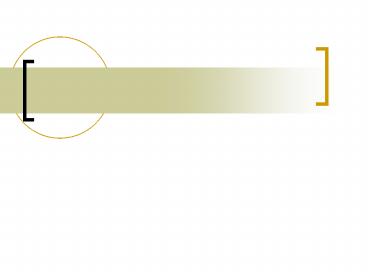Tumors and Large Scale DNA Damage - PowerPoint PPT Presentation
1 / 20
Title:
Tumors and Large Scale DNA Damage
Description:
In this paper we consider characterization of large scale structural changes ... phosphorescence instead of, or in addition to, reflection and absorption to ... – PowerPoint PPT presentation
Number of Views:86
Avg rating:3.0/5.0
Title: Tumors and Large Scale DNA Damage
1
(No Transcript)
2
Tumors and Large Scale DNA Damage
- Tumors are characterized by large-Scale DNA
damage - In this paper we consider characterization of
large scale structural changes such as deletion,
inversion .
3
Methods for Detecting Structural Changes
Deletion
Insertion
4
Method I PCR-array
- Base on Ion-channel sensor' principle proposed
by Sugawara et al 1987 - Idea
- DNA is electrochemically inactive
- the interaction of target DNA and a specific
protein was monitored by measuring redox peak
currents on cyclic voltammogram of redox-active
species
5
Method I PCR-array
When a target DNA duplex having a mismatch site
was captured by the MutS protein on the
electrode, the electrostatic repulsion arose
between polyanionic DNA duplexes and
negatively-charged ferrocyanide/ferricyanide
redox couple ions.
6
Method II FISH
- FISH Fluorescence in Situ Hybridization
- Step 1 Use fluorescent probes which bind only to
those parts of the chromosome with which they
show a high degree of sequence similarity - Step 2 Fluorescence microscopy can be used to
find out where the fluorescent probe bound to the
chromosome.
7
Method II FISH
Specific Molecules that absorb energy at a
specific wavelength and emit it at different
wavelength
FISH uses a Fluorescence Microscope that is based
on phenomena of fluorescence and phosphorescence
instead of, or in addition to, reflection and
absorption to detect gene mutation.
8
New Method?
- Problem with current methods
- Assume Homogeneous population of cells
- Fail if heterogeneous mix?
- FISH is to cumbersome and not accurate
9
New Method? Polymerase Chain Reaction
Can we take advantage of this technique to
amplify interested region?
10
New Method? PAMP Primer Approximation
Multiplex PCR
11
New Method? PAMP
12
PAMP Constraints/Problem
- Constraint
- Cover the region of the interest
- Primers should not be farther than 1kb
- Primers should not dimerize with each other
- Primer must satisfy physico-chemical
characteristics to allow polymerase reaction - Problem Optimize the amount of sequence space
which can be covered suing a fixed primer density
13
Sketching the Problem
Constraint Matrix
A
B
C
Nodes that have constraints are connected to each
other
Distance Matrix
Weight is distance beyond allowed max 0, DAB
14
Summarizing the problem
- There are n variables
- Some variables may conflict w. each other
- We would like to have neighboring variables
placed as closely as possible to each other, not
necessarily too close - Penalty max 0, (distance 10kb)
15
Complexity?
- Is it similar to Max2-SAT problem?
A Clause is a set of values given an
assignment Clause1 X1C1 S1C1, S1C2,
Variables can be set of assignment X1S1, X1
S1,
NP Hard?
16
Solution I
- Can we characterize the problem linearly?
A series of linear constraints on two variables
produces a region of possible values for those
variables. Solvable problems will have a feasible
region in the shape of a simple polygon.
Integer Linear Programming
17
ILP
What should we do if the answer is not Integer?
Add more LP constraint to force solutions to be
close to integer
18
PAMP in ILP
For conflicting primers
When both primers are selected
19
CSP (Constraint Satisfaction Programming)
- X x1,x2,,xn
- xi ? d(xi).
- c ? C
- specifies which values of the variables are
compatible with each other. - Filtering in CSP?
- Arc-consistency is a filtering method applied for
reducing search space.
20
CSP, filtering?
- Can we learn from failures?
- ABC ? Fail
- ABC ? Fail
- Thus AB ? Fail































